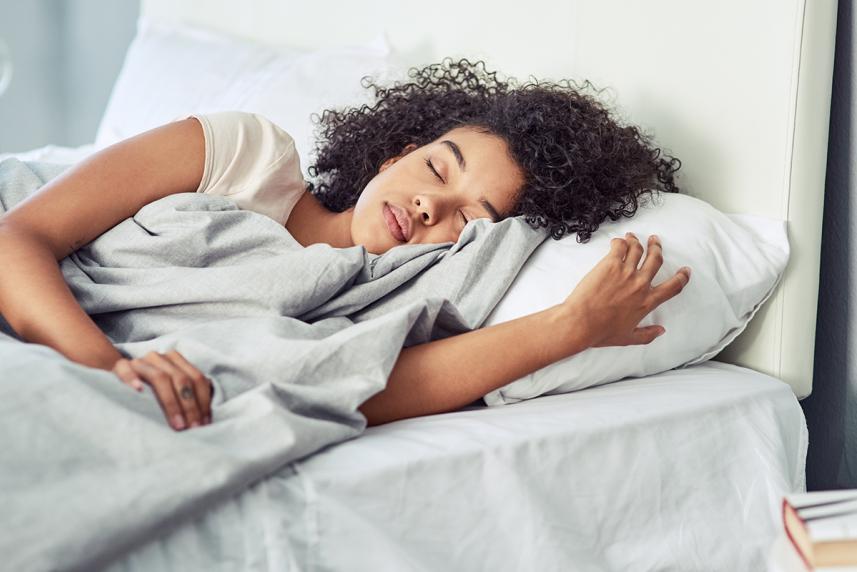
We carry a range of HSA- and FSA-eligible products, including over-the-counter medications, medical devices and more. And you can have it all delivered to your door.

Want a better night’s rest? These 4 devices take new approaches to an old problem.
You’ve probably experienced the following scenario at some point: You climb into bed, pull up the covers and then ... nothing. You wait. And toss. And turn. Until finally sleep comes — but only a few hours before morning. Or maybe you fall asleep quickly but find yourself wide awake at 3 a.m.
About 70 million Americans suffer from chronic sleep problems — and 1 in 3 adults don’t get enough sleep, according to the Centers for Disease Control and Prevention. Aside from making you groggy, sleep issues can have serious health implications, from lower immunity to an increase in blood pressure and heart disease.
Luckily, tech wizards of the world have come up with devices that can help you get more and better sleep. Here’s how giving your sleep routine an upgrade can boost your wellness.
“Sleep is related to pretty much every outcome people care about: Healthy sleep can improve brain function, metabolism, immune system, mental clarity, energy level, productivity and efficiency, mental health, cardiovascular health and even weight management,” says Michael Grandner, PhD. He’s the director of the Sleep and Health Research Program and the Behavioral Sleep Medicine Clinic and is an associate professor of psychiatry at the University of Arizona College of Medicine in Tucson.
While multiple factors impact sleep, one thing that may be holding some back from a good night’s sleep is their attitude toward it, Grandner says. “We see sleep as a ‘cost’ of time rather than an investment in our next day’s success.” So step one is to treat sleep as seriously as you might other wellness practices.
The Optum Store has a range of products and devices to help you catch your z’s. Start shopping now.
As you probably know, the foundation of good sleep includes strategies such as keeping your room quiet and going to bed and waking up at the same time each night and day. That’s where smart devices come in: They can assist you in developing and sticking with those sleep-better habits.
“The key is to recognize their strengths and limitations — optimize what they can do and don’t get distracted by what they cannot do,” Grandner says. In other words, consider them potential additional tools for your sleep toolkit, not your only ones.
Here, 4 high-tech options to try, depending on what’s keeping you awake at night:
“Even small amounts of noise can impact sleep by activating the brain when it’s trying to detach from the environment,” Grandner says. “The brain also processes not only sound itself but the context of the sound and whether it’s deemed ‘important.’”
That’s one reason loud, continuous background sounds, such as an airplane engine, tend to be less disruptive than hearing an alarm or people talking.
White noise machines help soften those sounds, but Bose Sleepbuds II help truly mute them out. The small, lightweight wireless earbuds connect to an app via Bluetooth and deliver a variety of white noise (think: gentle ocean waves).
They fit snuggly and are comfortable even when you sleep on your side. The result is a blanket of unobtrusive sound that drowns out snoring, talking, traffic and more. It also has a built-in alarm only you can hear.
The Withings Sleep Cycle Tracking Pad, Steel Sport HR Health & Fitness Tracking Watch and other sleep-tracking devices like them monitor your heart rate, movement and snoring throughout the night. The data is then translated into a rating, or “sleep score,” and can even show various stages of sleep over time.
While there is no perfect way to measure z’s, especially when it comes to sleep stages, Grandner says, trackers provide a rough but educated guess of how well (or not) you’re sleeping.
That may be useful in identifying problem areas, such as snoring or waking up during the night, and specific strategies that are most helpful. “It’s what you do with the information that matters,” Grandner says.
As with sleep trackers, home test kits such as the Everlywell Sleep & Stress Test may provide insights on steps you can take to improve sleep. Many involve collecting blood, saliva or urine samples and sending them to a lab for analysis. What’s measured by the Everlywell test:
Melatonin is a hormone your brain produces that tells your body it’s time to sleep. It’s not a sedative that makes you sleepy. Instead, it helps regulate your body’s internal clock. Melatonin naturally increases at night in response to darkness, then wanes in the morning as the sun rises.
So if you regularly have bright lights on at night, that may interfere with melatonin production and make it harder to fall asleep. (Read more about how to use melatonin and other over-the-counter (OTC) sleep aids.)
Cortisol plays a role in sleep and how we respond to stress. The hormone ebbs and flows over the course of the day — rising in the morning to help you wake up and dipping in the evening as you get ready for sleep.
In terms of stress, it rises or stays elevated when you perceive a threat (i.e., bills or work). This keeps you alert and primed, ready for “fight or flight” — not exactly the state you want to be in come bedtime. Stress-reduction techniques can go a long way toward helping you wind down before turning in.
Cortisone is produced by the adrenal glands and is converted to cortisol in the body and serves similar functions.
Once you have your results, Everlywell offers a webinar with a health care professional who can answer questions and help you devise a sleep-improving or stress-reducing strategy. (The Optum Store sells a range of home tests for everything from hormones to nutrient levels. Explore now.)
While there’s no definitive research showing essential oils and aromatherapy have great power over sleep, there’s more to the story: When we smell something pleasant, it elicits a positive emotional or psychological response that may help you relax.
Your brain also creates associations with specific scents, according to the Sleep Foundation. So if you’ve smelled lavender or rose in the past in an aaaah setting — say, during meditation or a massage treatment — that may cue up the relaxation vibes for you at bedtime.
One way to use oils is with water in a diffuser such as Nature’s Truth Ultra Sonic Aromatherapy Diffuser, which uses vibrations to turn the mixture into a scented mist. Ultrasonic diffusers tend to give off a subtler aroma than other types, but still start with just 2 or 3 drops of oil to avoid oversaturating your room. At overpowering levels, even relaxing aromas feel cloying.
While these tech hacks are helpful for shut-eye, be aware of the devices that make it harder to get to sleep. The artificial blue light from screens and bulbs can signal your brain to stay awake. Turn off the TV and put down your phone, tablet or computer in the hours leading up to bedtime, and turn down the lights in your home at night. And have a great night’s sleep.

We carry a range of HSA- and FSA-eligible products, including over-the-counter medications, medical devices and more. And you can have it all delivered to your door.
Additional sources
Sleep stats: Centers for Disease Control and Prevention (2017). “Sleep and Sleep Disorders”
Sleep and heart health: Centers for Disease Control and Prevention (2021). “How Does Sleep Affect Your Heart Health?”
Sleep basics: Sleep Foundation